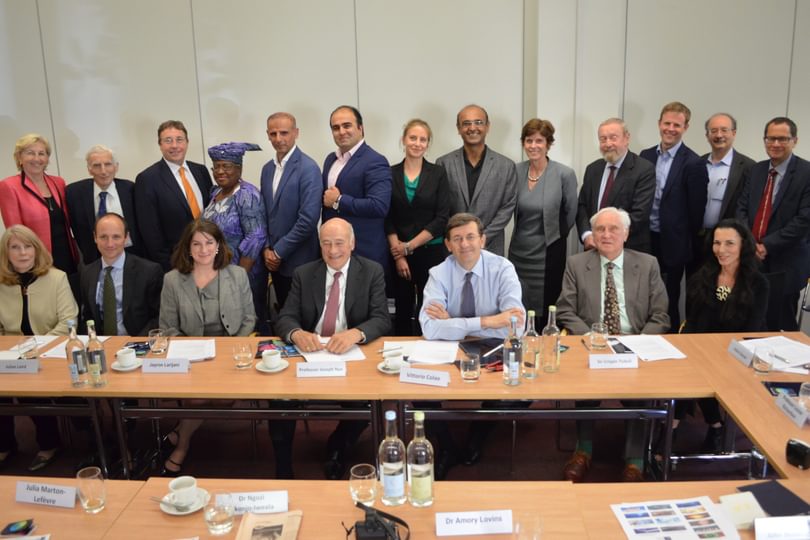
Members of the Oxford Martin School’s Advisory Council gathered for their annual meeting on 7 June.
The Council was welcomed by Professor Louise Richardson, Vice Chancellor of the University, before Achim Steiner, Director of the School, presented reflections on his first year in post. Professor Roger Goodman, Head of the University’s Social Sciences Division, then gave views on the past year from the School’s Management Committee, which he chairs.
The Council enjoyed presentations on six Oxford Martin School research programmes and partnerships, followed by questions and discussions on their work.
Professor Cameron Hepburn detailed the progress of the Oxford Martin Net Zero Carbon Investment Initiative, which has been working closely with international governance initiatives on how investment can provide a route to a zero carbon economy, and will publish its findings later this year.
Dr Friederike Otto and Professor Yadvinder Malhi gave overviews of their work on the Oxford Martin School TNC Climate Partnership, with Dr Otto explaining the distributed computing used to model large-scale weather patterns, and Professor Malhi giving insights into complex modelling of the Amazon region to understand the impacts of extreme weather on biodiversity and ecosystem function.
Professor Kazem Rahimi and Dr Reza Khorshidi presented the work of the Oxford Martin Programme on Deep Medicine, one of three new programmes created by the School’s most recent round of funding awards. Using large-scale datasets and machine learning, the programme aims to develop new methods to generate insights into complex disease patterns, risk trajectories and treatment effects. The work of another of the School’s new programmes, the Oxford Martin Programme on Affordable Medicines, was presented by Professor Chas Bountra, who described the programme’s ambition to generate new, data-backed evidence for open innovation in drug discovery, as opposed to traditional ‘closed’ models, which are costly and have high failure rates.
Professors Dominic Johnson and David Macdonald explained how the phenomenal response to the death of Cecil the Lion in 2015 had sparked a new collaboration, the Oxford Martin Programme on Natural Governance, to investigate how individuals and nations can set aside their self-interests and cooperate for the common good.
The School’s newest partnership, the Rockefeller Foundation Economic Council on Planetary Health at the Oxford Martin School, was presented by its Executive Secretary, Dr Doaa Abdel-Motaal. She outlined the mission of the Council, an assembly of global experts led by Yale University professor and former President of Mexico, Ernesto Zedillo, to demonstrate the economic and policy case for the emerging field of planetary health, which accounts for the link between human health and the natural systems on which it depends.
The Council members praised the breadth and direction of the research presented, and the quality of the presentations. A number of discussions then took place around connecting researchers with relevant work taking place within organisations led by members, sparking ideas for further collaborations.
Strategic discussions on the future direction of the School’s development and growth were then led by Mr Steiner, with lively and insightful contributions from Council members, many of whom had travelled from overseas to attend the meeting.
The Advisory Council expressed its appreciation to the outgoing Director, Achim Steiner, and the School's central team, for the excellent progress made during the past year, and to Professor Roger Goodman for his leadership and dedication in steering the School during his decade-long tenure as Chair of the Management Committee.
Mr Steiner will leave the Oxford Martin School on 16 June for his new role as Administrator of the United Nations Development Programme. The School’s Acting Director will be Professor Steve Cowley, while the process of recruiting a permanent replacement takes place.